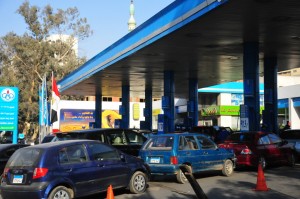
(Photo by: Hassan Ibrahim)
By Farah Atia
Fuel experts regard Egypt’s diversion to Swiss trading houses for fuel “normal” as the country’s compiling debt and thinning international currency reserves have prompted smaller firms to stop delivering.
“This is a normal scenario in this situation since central bank foreign currency reserves are very low,” according to Tarek Selim, economics professor at AUC and energy expert. “This is particularly alarming as it points to that the financial economy is keeping the nation from paying its obligations,” he said, adding “Egypt needs to pay its suppliers in dollars. Right now, Egypt does not have enough foreign currency reserves to do so.”
According to Reuters, Egypt, which owes more than $5 billion to fuel suppliers, has shifted to large Swiss trading houses after small firms stopped delivering to the financially crippled nation, fearing that it will fail to pay.
The Egyptian government has been struggling with a shortage of fuel, a predicament symptomatic of an ailing economy stuck in a downward spiral since the revolution in 2011. While some attribute this crisis, which has hit the country’s industrial sector, power plants and fuel stations, to smugglers and bootleg markets, the American Chamber of Commerce said it’s the result of “the government’s recent inability to pay its fuel suppliers.”
Litasco, Glencore, Gunvor, Trafigura, Vitol and Mercuria are currently Egypt’s main suppliers; smaller firms such as BB Energy, AOT Trading, Eminent, Augusta and Sahara have stopped selling it fuel, Reuters reported earlier this week.
The situation is not new; almost a year ago, Vitol and Glencore were among the main suppliers of diesel cargoes to the ports of Suez, Alexandria and El Dekhaila after smaller oil companies stopped participating in the tenders because of the high level of risk and complications with letters of credit from banks.
Litasco, trading subsidiary of Russia’s Lukoil, won the majority of a tender by Egypt’s state oil company for delivery of gas oil to the Mediterranean port of Alexandria during the second half of 2013, according to the Egyptian Credit and Risk Association. Petroineos, BP and Glencore were also winners. Litasco will provide 15 cargoes, BP five, Glencore five and Petroineos three cargoes in the period from July to December 2013.
Egypt awarded the tender at a premium of US$17.90-$22.73 a tonne. Under a separate tender, Litasco, Mercuria and Glencore will deliver cargoes to port of Dekheila at a premium of US$19.70-$23 a tonne.
Current premiums are higher than the $16-$19 premium at the end of last year, making it more expensive for the economically challenged nation to secure suppliers.
Egypt has been sluggish when it comes to paying fuel suppliers, who constantly face discharging delays, leading to significant demurrage charges.
Meanwhile, the country’s petroleum minister Sherif Haddara said strategic reserves of three vital fuel products will run out by end of this month, according to state-run Al Ahram newspaper. “Egypt has enough diesel fuel to last eight days, butane enough for ten days and petrol enough for 14 days,” he said, adding that the government is currently providing the nation’s gas stations with 18,000 tonnes of octane per day and 37,000 tonnes of diesel fuel, while also providing the country’s power stations with 23,000 tonnes of low-quality mazut fuel.
“Our main concern today is to secure additional resources for oil and gas production,” Haddara said in a public statement.
According to Haddara, the petroleum ministry’s first strategic initiative is to encourage exploration efforts in frontier areas such as the Gulf of Aqaba and the Red Sea. “We realise that this will require significant investments, and the use of state-of-the-art technology. We are certainly open to both our long-life partners and new players to address the investment and technology needs of those difficult exploration efforts,” he stated.
“We will also increase production and reserves of our mature reservoirs,” he said, adding that the petroleum sector should produce energy from non-fossil fuel sources by exploiting Egypt’s geothermal energy potential, and work with the right partners towards materialising electricity generation from geothermal wells.
Selim added that subsidised energy traded in the black market is a big problem. “The lack of security in Egypt has caused a black market for fuel to widely emerge,” he said, adding that ineffective border control encouraged the emergence of a black market which abuses taxes to make profits, a situation he described as “very unethical.”
“A way to solve the fuel crisis is to hedge energy contracts; there are international financial institutions specialised in hedging. This is, however, costly and requires a budget surplus which makes this solution unfeasible,” he said, adding that another solution is to look for other energy companies in more risky emerging countries, like China, India and Russia. “These companies will not require payment in USDs or Euros,” he stated.
“If political unrest persists, there could be a bigger shortage of hard currency which will push the nation towards a deeper recession,” he said.



